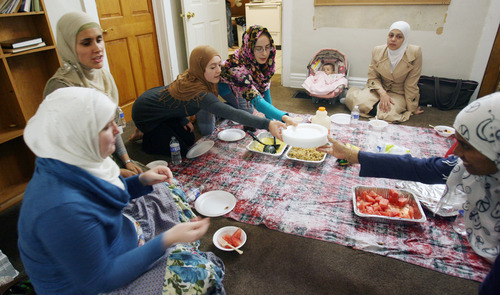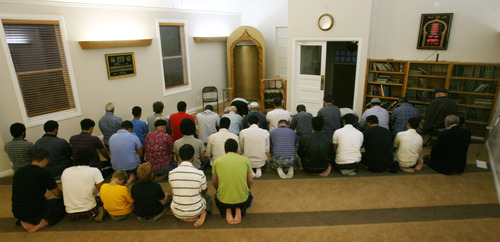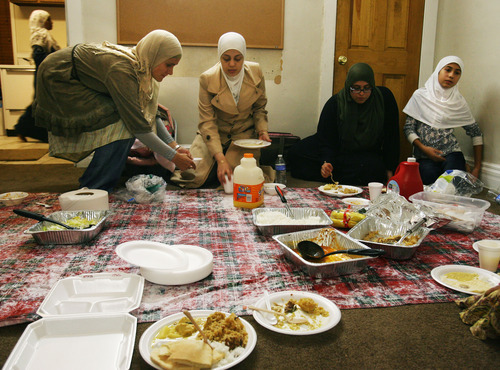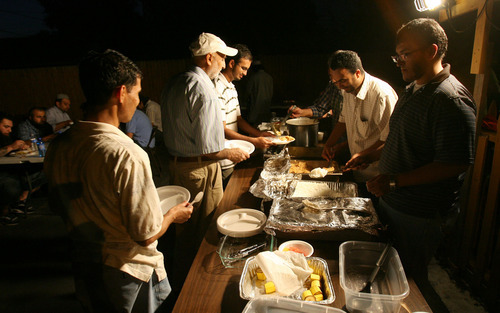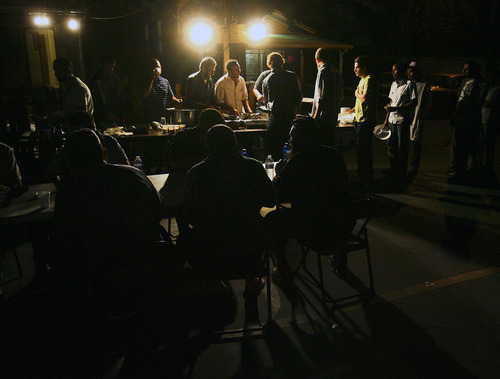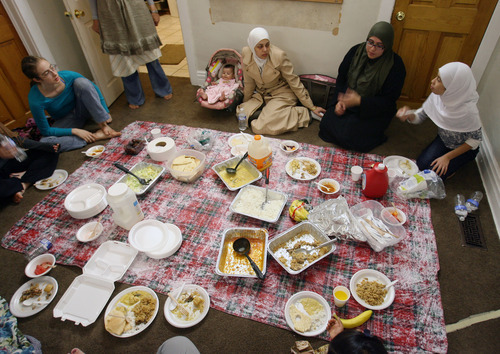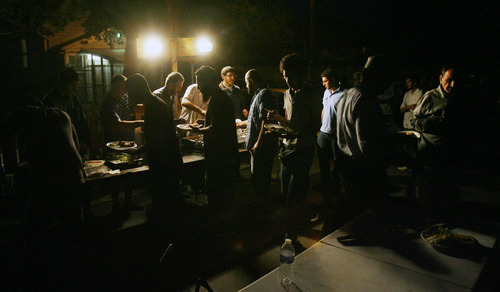This is an archived article that was published on sltrib.com in 2012, and information in the article may be outdated. It is provided only for personal research purposes and may not be reprinted.
Just after an orange sun fell beneath the horizon Tuesday night, eight Muslim women were sitting around a floral-print tablecloth on the floor of a Salt Lake City house, ready to eat. A knock on the door came and a man in a button-down blue shirt delivered the evening's delicacies — curried chicken, brown rice with beef, vegetable soup and a pile of pita bread.
The women had come together at a house adjacent to Salt Lake City's Masjid Al-Noor Mosque at 740 S. 700 East — as they often do for evening prayers — to break their daily fast and chat about families and faith, while the men and boys did the same outside.
It is nearing the end of Ramadan, the Islamic holy month during which 1.2 billion Muslims worldwide fast from sunrise to sunset for 30 days, read the Quran, give to the poor, and do as many good deeds as possible.
Ramadan, one of Islam's five pillars, shifts each year, starting 10 days later each time. It is especially tough when it falls in summer, with long days of sunlight. During this cycle, the Islamic faithful, including Utah's 30,000 Muslims, do not eat or drink after light hits the sky — some days as early as 4:30 a.m. — and wait until nearly 9 p.m. before breaking their fast.
In a bit of role reversal, the men at this Utah mosque provide and prepare the food for everyone, along with serving it and cleaning up afterward. Some of the courses come from Muslim-owned restaurants such as Curry in a Hurry and the Indian Market; some comes from individual homes.
That way, women don't have to cook or grocery shop while fasting.
"My husband does all the cooking at home anyway," quips Khadijah Pirieda, one of the women.
Eleven-year-old Jennah (who didn't want to give her last name) fasted last year for the first time, alternating one day on and one day off. This year, she has been able to forgo food and drink just as adults do.
"I don't really think abut it," Jennah says.
That's because Ramadan involves so much more than giving up food, Pirieda says. "It's a time of reflection and a time of mercy, a chance to repent of everything. Our hearts are fasting from anger. Our ears are fasting from hearing bad things. Our eyes are fasting from inappropriate images."
It's like touching "a reset button," she says. "We may not be eating food, but we are feeding our souls."
During this month, every good deed is counted 10 times, but every bad deed counts only once, Pirieda jokes, like a "spiritual clearance sale. Such a good deal."
The final 10 days of Ramadan, which ends Aug. 19, are considered the most sacred, says Anwar Arafat, Al-Noor's imam. This period includes the "Night of Power," or "Destiny," the time when the Prophet Muhammad received his first instance of angelic inspiration.
"On this night, Muslims believe God reveals to the angels what is going to happen in the upcoming year," Arafat says. "We try to pray on that day, hoping the year will be blessed and fruitful."
It is unclear which of the 10 days is the momentous one, which is why many Muslims go to the mosque on each of the final nights, he says. "Whoever is worshipping on that night will have a good year."
They pray repeatedly, read long passages from the Quran and then eat breakfast together before first light. Some sleep at the mosque or worship all night there.
The holy text, the imam says, declares that prayer on that one night is better than 1,000 months of worship.
"I feel tired, but that's exactly what we want [during Ramadan] — to be exhausted in our love of Allah," says Miriam Jazari, who has her two young sons with her. "It's intense, but it's only one month."
Facebook.com/peggy.fletcherstack
Twitter: @religiongal —
Islam's five pillars
Acknowledge that there is no God but Allah and that Muhammad was his prophet.
Pray five times a day, with prescribed prayers at prescribed hours.
Observe the holy month of Ramadan.
Give alms to the poor.
Make a pilgrimage to Mecca during the hajj at least once in a lifetime.


